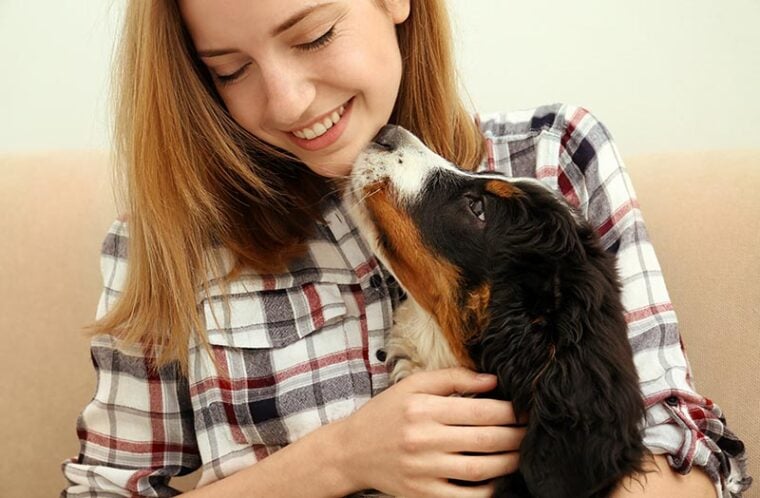
Have you ever had a situation where your dog seems jealous of your partner? Perhaps your partner walks up and hugs you and your dog growls or tries to intervene in some way. Should you be concerned? Can dogs get jealous of your partner? Yes, dogs can become jealous of other people in addition to other pets. But why does this behavior occur?
Read on to learn why dogs may become jealous of your partner and how to stop the unwanted behavior.
Why Do Dogs Get Jealous of Your Partner?
Before we go any further, let’s define the word “jealousy.” Jealousy is defined as a feeling of unhappiness because someone has something you want. In general, a dog’s jealousy is strikingly similar to human jealousy. Dogs are social species and form strong emotional bonds with their owners. Anything that threatens this relationship may lead to jealous behavior. So, why do some dogs get jealous? Let’s look at possible reasons
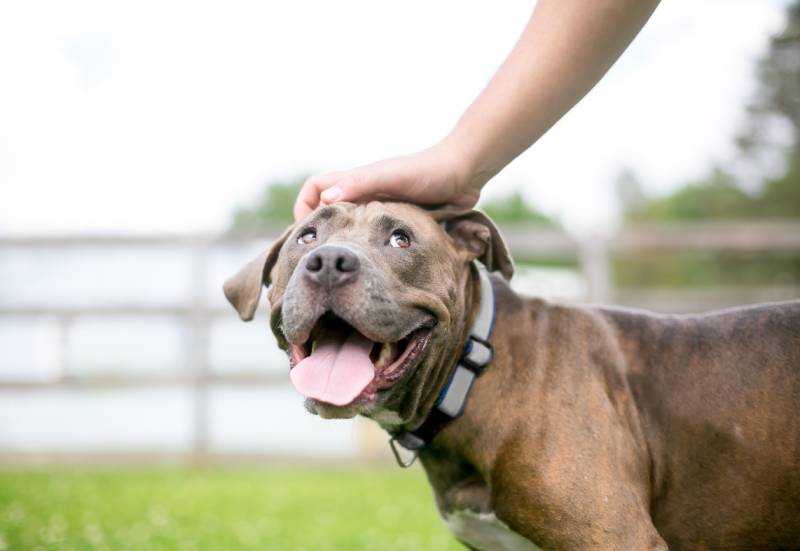
New Family Member
When your dog has a strong bond with you, they may feel betrayed because your attention is focused elsewhere; for instance, your partner. If a new person enters your life, even a newborn baby, dogs may become jealous because your attention is not on them as much as it used to be.
Change in Environment
Dogs are creatures of habit, and when there’s a change in their everyday routine, jealousy and confusion may set in. Such events like moving into a new home or moving in with your partner may set off jealous tendencies as well as insecurity and anxiety.
A New Pet
Some dogs may welcome a new furry friend, but others may become jealous and act out. Interestingly, a study conducted by the University of California showed that some dogs were jealous of stuffed animals that barked, whined, or wagged their tails. When the pet parent interacted with the inanimate object, some dogs growled, tried to get in between the pet parent and object, or pushed up against the pet parent.
How to Read Your Dog’s Body Language
Dogs often communicate using body language, and knowing how to read it is crucial in differentiating between cheerful and aggressive behavior. While every dog has their own way of expressing themselves, most dogs use similar postures to communicate their feelings.
When observing your dog’s body language, it’s important to know that a dog uses their entire body to convey feelings. For example, one might think that a wagging tail means the dog is happy and relaxed, but this isn’t always the case, especially if the dog’s body is stiff and rigid. In fact, the tail, the expression on the face, the ears, and the placement of the feet all work together to convey a dog’s emotional state.
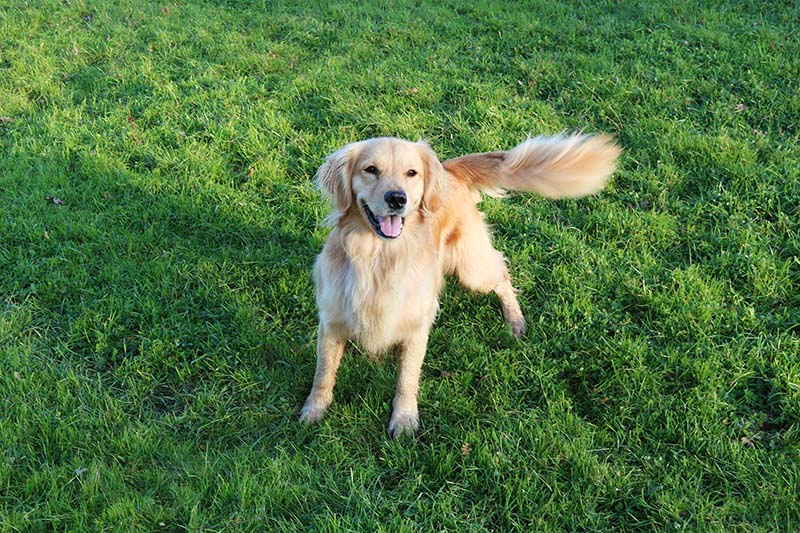
Signs of Relaxed Body Language in Dogs
To better assist you in determining your dog’s behavior, the signs below will help you learn if your dog is happy.
Signs of a Jealous Dog
While some signs of jealousy may be obvious, others may be slightly misconstrued, but it’s vital to know the differences.
How to Remedy Your Dog’s Jealous Behavior
When a dog is jealous of your partner or something else, the situation can become frustrating and may even become dangerous depending on the dog and if aggression develops. If your dog is jealous of your partner, you’ll need to nip it in the bud before things get out of hand, such as urinating in the home, aggression, or even your dog developing anxiety disorders.
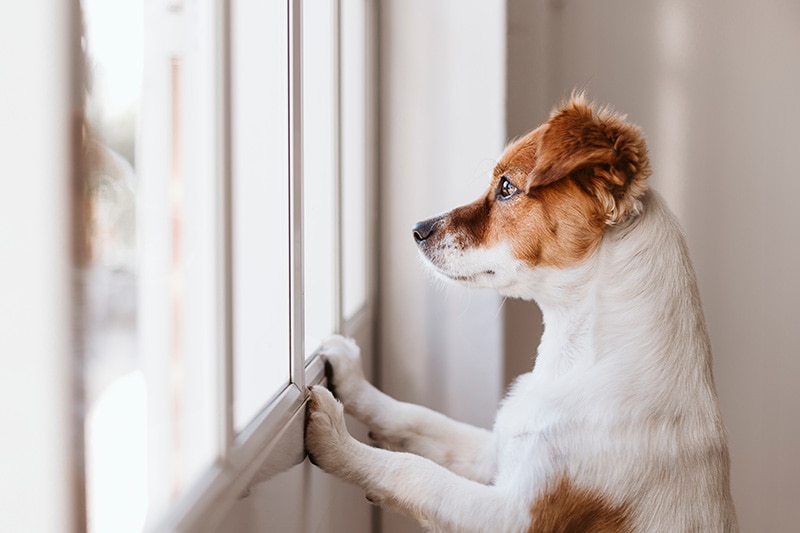
Slowly Introduce Your Dog to Your Partner
Slowly is the keyword here. You can’t expect your dog to be happy and excited right off the bat when seeing someone new for the first time. It takes time for a dog to get used to a person in some cases, and this may be the situation for you, your dog, and your partner. When someone new enters your life, your dog may not be too keen on the idea. If that person is important to you, taking steps to introduce your partner and your dog is essential to having a stress-free environment for everyone.
An effective way to introduce your dog to your partner is by bringing home a piece of clothing or some other material with your partner’s scent. Allow your dog to smell the object briefly with short sessions scattered throughout the day for a couple of days or so. That way, when your partner comes over in the flesh, your dog will already be familiar with the scent.
Ensure you pet your dog before engaging with your partner so your dog doesn’t feel left out and make sure your dog has a safe space to retreat to if they feel uncomfortable with your partner’s presence.
Maintain Their Routine
It’s important to maintain your pup’s routine as much as possible when introducing them to your partner, this includes meal, play and walk times. If adjustments need to be made, make these gradually so there is not too much change for your dog to cope with all at once. You can also gradually start to include your partner when you’re having quality time with your dog. In time, your dog will start seeing your partner as a friend instead of a rival.
Reward good behavior
Give attention, praise and treats to your dog when they are acting calmly. Most dogs are smart creatures, and if you reward bad behavior, you’re setting up a possibly disastrous scenario. A jealous dog will usually seek your attention, and if you give them a treat to distract them from your partner, you’re only adding fuel to the fire.
However, punishing your dog for their jealous behavior will only make it worse. It’s important to stay calm and help your dog learn that they have nothing to be jealous or insecure about.
Continue to bring your partner around your dog. You can provide a treat when they behave appropriately. Never leave your dog alone with your partner until you’re sure your dog is comfortable and accepting of the person. You can also enlist the help of a certified veterinary behaviorist if the situation does not improve.
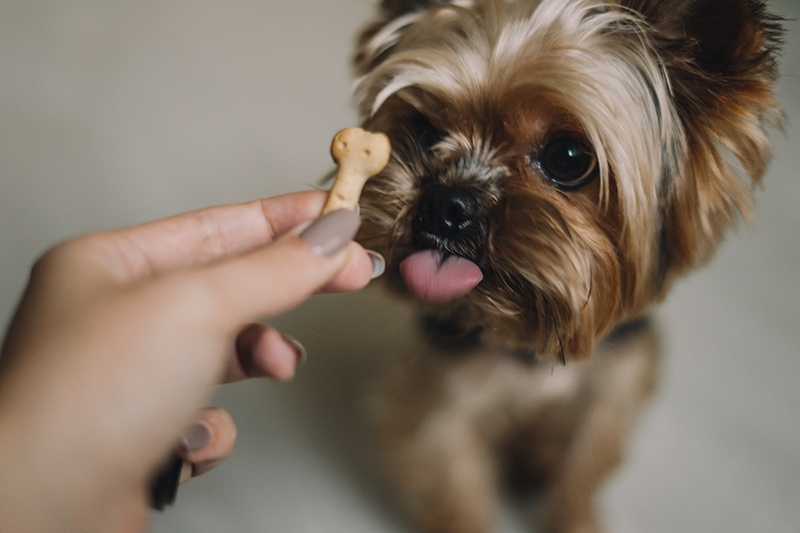
Final Thoughts
Dogs can most certainly become jealous of your partner—don’t lose hope if this happens to you. It’s important to acclimate your dog to your partner slowly. Bringing home articles of clothing or other material with your partner’s scent can help your dog become accustomed to the scent, which, in turn, will help ease anxiety when your dog sees your partner in person.
Never ignore the situation, as this will only make matters worse. If you need help, consult a certified veterinary behaviorist, especially if aggression is involved, such as showing teeth and growling.
Featured Image Credit: Africa Studio, Shutterstock







